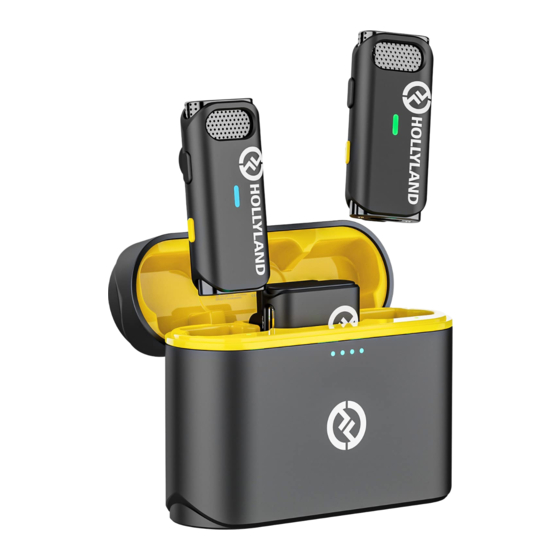
Advertisement
Quick Links
Advertisement

Summary of Contents for Hollyland LARK M1
- Page 1 LARK M1 User Manual...
- Page 2 LARK M1 EN-02...
-
Page 3: Packing List
PACKING LIST 2-person Wireless Microphone System ➀ ➁ ➂ Charging Case x1 Transmitter x2 Receiver x1 ➃ ➄ ➅ Furry Windshield x2 3.5mm TRS Patch Cable 3.5mm TRS to TRRS Patch (for cameras) x1 Cable (TRRS compatible) x1 ➆ ➇ ➈... -
Page 4: Product Introduction
PRODUCT INTRODUCTION TX: Transmitter RX: Receiver Charging Case for 2-person Wireless Microphone System ➀ Status Indicator ➀ Type-C Port ➀ Indicator Inside the Case ➁ Built-in Microphone ➁ Pair/Volume Up Button ➁ Indicator Outside the Case ➂ Power Button ➂ Mode Switch/Volume ➂ USB Type-C Port ➃ Pair/HearClear Noise Down Button... -
Page 5: Product Installation
PRODUCT INSTALLATION The TX and RX automatically turn on and Clip the TX to a shirt collar. pair with each other out of the box. EN-05... - Page 6 PRODUCT INSTALLATION iPhone connection Android phone connection Connect the RX to iPhone with the Connect the RX to the phone with the 3.5mm 3.5mm TRS to Lightning Cable. TRS to USB Type-C Cable. EN-06...
- Page 7 PRODUCT INSTALLATION Camera Connection Connection with TRRS Compatible Devices Install the RX on the camera. Connect the RX to a TRRS compatible device Connect the RX and the camera with the 3.5mm TRS to TRRS Patch Cable. 3.5mm TRS Patch Cable. EN-07...
-
Page 8: Camera Settings
CAMERA SETTINGS To ensure optimal use with the camera, please follow the settings as recommended below. � � -�� -�� -�� -�� -� �dB -�� -dB�� �� � SONY camera Canon camera Fujifilm camera Camera recording volume Recording level set to 1 block External microphone set to 1 volume set to -26dB... - Page 9 INDICATOR LIGHTS GUIDE Indicator Lights Guide - RX &TX Indicator Light Status Device Status Blue indicator light stays on Device connected Blue indicator light flashing Device disconnected Red indicator lights on TX & RX stay on Low-battery TX 2 red indicator lights flashing on RX Low-battery RX Orange indicator light flashing Device in charging (charging when powered off)
- Page 10 INDICATOR LIGHTS GUIDE Indicator Lights Guide - Charging Case Indicator Light Status Device Status Charging case in charging One indicator light outside the case flashing (refer to the number of shining indicator lights when connected via USB for charging progress) Four indicator lights outside the case stay on Charging case fully charged Indicator lights inside the case breathing...
- Page 11 OPERATING GUIDE Auto Power On/Off Remove TX/RX from the charging case, it will automatically turn on. Put TX/RX back in the charging case, it will automatically turn off. Manually Power On/Off Hold Power Button of TX/RX for 3s seconds to power on/off the device manually. (Figure 1) Auto Pairing Remove TX/RX from the charging case, they will automatically pair with each other.
- Page 12 OPERATING GUIDE Auto Charging Put the devices back to the charging case, the auto-charging starts. Manually Charging Charge the TX, RX, and Charging Case separately via the Type-C port of each unit. Turn On/Off HearClear Noise-Cancelling Function on TX Press the Pair/HearClear Noise-Cancelling Button on TX to turn on/off the noise-cancelling function.
- Page 13 OPERATING GUIDE Mode Switch Long press the Mode Switch/Volume Down Button for 5 seconds to switch modes: Green static light indicates Camera Mono Mode Blue static light indicates Phone Mode or Camera Stereo Mode (depending on the device connected) (Figure 5) (Figure 5) EN-13...
- Page 14 PARAMETERS Wireless Transmission 2.4GHz Adaptive Frequency Hopping (AFH) Transmission Range 40M (free movement), 200M (LOS) Polar Pattern: Omnidirectional In-Built Microphone Frequency Range: 20Hz ~ 20KHz Maximum SPL 110dB SPL Input Dynamic Range 86 dB TX: 140mAh (0.518Wh) Battery Type RX: 200mAh (0.76Wh) Charging Case: 1400mAh (5.18Wh) TX: 8H Runtime...
- Page 15 Note: The frequency range and wireless transmit power of the device vary based on the regulations of different countries and regions. Safety Precautions Do not place the product near or inside heating devices (including but not limited to microwave ovens, induction cookers, electric ovens, electric heaters, pressure cookers, water heaters, gas stoves) to prevent the battery from overheating and exploding.
- Page 16 FCC Requirement Any changes or modifications not expressly approved by the party responsible for compliance could void the user's authority to operate the equipment. This device complies with Part 15 of the FCC Rules. Operation is subject to the following two conditions: (1) this device may not cause harmful interference.















Need help?
Do you have a question about the LARK M1 and is the answer not in the manual?
Questions and answers